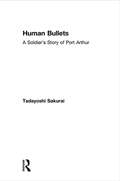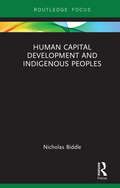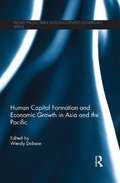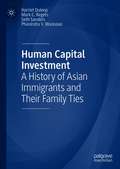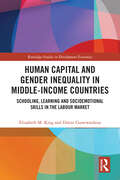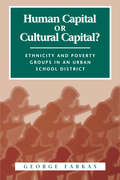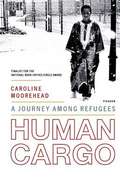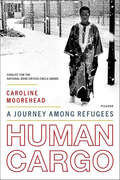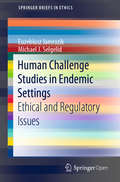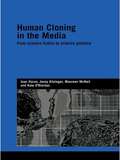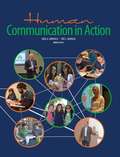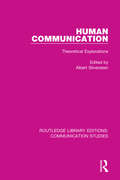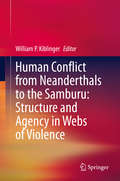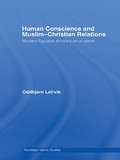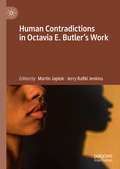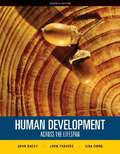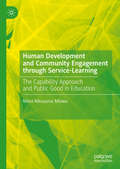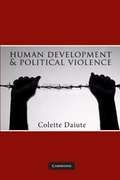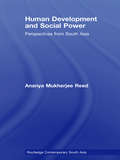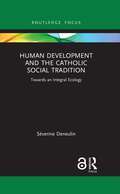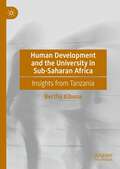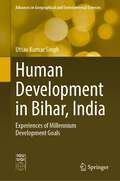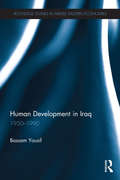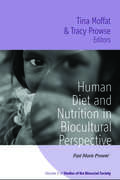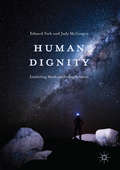- Table View
- List View
Human Bullets: A Soldier's Story Of Port Arthur
by SakuraiFirst published in 2008. Routledge is an imprint of Taylor & Francis, an informa company.
Human Capital Development and Indigenous Peoples (Routledge Studies in Indigenous Peoples and Policy)
by Nicholas BiddleIn all countries for which data is available, Indigenous peoples have lower rates of formal educational participation and attainment than their non-Indigenous counterparts. There are many structural reasons for this, but it may in part be related to the perceived relationship between the costs and benefits of education. Human Capital Development and Indigenous Peoples systematically applies a human capital approach to educational policy, to help understand the education and broader development outcomes of indigenous peoples. The basic Human Capital Model states that individuals, families and communities will invest in education until the benefits of doing so no longer outweigh the costs. This trade-off is often considered in monetary terms. Here the author broadens cost-benefit definitions to include health and wellbeing improvements alongside social costs driven by discrimination and unfair treatment in schools. With coverage of the Americas, Asia, Australia and New Zealand, the book critiques existing approaches, and provides an outlet for the self-described experiences of a diverse set of indigenous peoples on the breadth of educational costs and benefits. Combining new quantitative analysis, cross-national perspectives and an explicit policy focus, this book provides policy actors with a detailed understanding of the education decision and equips them with the knowledge to enhance benefits while minimising costs. This book will appeal to policy-engaged researchers in the fields of economics, demography, sociology, political science, development studies and anthropology, as well as policy makers or practitioners who are interested in incorporating the most recent evidence into their practice or frameworks.
Human Capital Formation and Economic Growth in Asia and the Pacific (PAFTAD (Pacific Trade and Development Conference Series))
by Wendy DobsonThe entire planet looks to Asian and other emerging markets to sustain growth momentum as traditional markets in the USA and Europe struggle with the slow and arduous processes of deleveraging after the global financial crisis. At the same time, there is growing recognition in Asia that the sources of growth must shift to sustain their own growth momentum in the years ahead. Heavy reliance on the region’s high savings rates and plentiful supplies of low-cost labour will have to shift towards increasing the human capital embodied in more educated and skilled labour forces capable of contributing to productivity growth and innovation as future drivers of growth. Human Capital Formation and Economic Growth in Asia and the Pacific focuses on why and how countries are making this shift. The demographic transition is shown to be a significant factor as ageing populations in Japan, South Korea and China manage declining growth in the labour force by stepping up investments in education, and by changing policies and institutions. Lessons to be learned from these experiences by more youthful populations in Southeast Asia are explored. In addition, attention is paid to the consequences of cross-border differentials in technical knowledge and the quantity and quality of human capital. Several implications for public policy and for international cooperation on human-capital issues in the Asian region are identified. The chapters in this volume are edited versions of papers presented at the 35th Pacific Trade and Development conference held in Vancouver, Canada, in June 2012. The conference goal was to better understand how governments and business in Asia and the Pacific can apply the key insight that one of the reasons economies grow is because of human-capital formation – the quality and diversity of the labour force are augmented – not just because the labour force grows in size. Students of Asia’s growth prospects will find several aspects of this volume of particular value. It includes chapters on the big-picture conceptual and measurement issues; on country experiences in meeting the imperatives of the demographic transition and investing in education and skills training; and on country experiences with attracting foreign knowledge and the supply and recruitment of skills across borders in Asia and the Pacific. Policymakers will also find useful the discussions of policy implications and the menu of issues requiring intergovernmental cooperation within the Asian region.
Human Capital Investment: A History of Asian Immigrants and Their Family Ties
by Phanindra V. Wunnava Harriet Duleep Mark C. Regets Seth SandersIn 1965, a family-reunification policy for admitting immigrants to the United States replaced a system that chose immigrants based on their national origin. With this change, a 40-year hiatus in Asian immigration ended. Today, over three-quarters of US immigrants originate from Asia and Latin America. Two issues that dominate discussions of US immigration policy are the progress of post-reform immigrants and their contributions to the US economy. This book focuses on the earnings and human capital investment of Asian immigrants to the US after 1965. In addition, it provides a primer on studying immigrant economic assimilation, by explaining economists’ methodology to measure immigrant earnings growth and the challenges with this approach. The book also illustrates strategies to more fully use census data such as how to measure family income and how to use “panel data” that is embedded in the census. The book is a historical study as well as an extremely timely work from a policy angle. The passage of the 1965 Immigration and Nationality Act set the United States apart among economically developed countries due to the weight given to family unification. Based on analyses by economists—which suggest that the quality of immigrants to the US fell after the 1965 law—policymakers have called for fundamental changes in the US system to align it with the immigration systems of other countries. This book offers an alternative view point by proposing a richer model that incorporates investments in human capital by immigrants and their families. It challenges the conventional model in three ways: First, it views the decline in immigrants’ entry earnings after 1965 as due to investment in human capital, not to permanently lower “quality.” Second, it adds human capital investment and earnings growth after entry to the model. And finally, by taking investments by family members into account, it challenges the policy recommendation that immigrants should be selected for their occupational qualifications rather than family connections.
Human Capital and Gender Inequality in Middle-Income Countries: Schooling, Learning and Socioemotional Skills in the Labour Market (Routledge Studies in Development Economics)
by Elizabeth M. King Dileni GunewardenaThe role of cognitive and socioemotional skills alongside education in determining people’s success in the labour market has been the topic of a growing body of research—but previous studies have mostly missed middle-income countries and the developing world because measures of those skills and data on employment and earnings on large enough samples of adults have typically not been available. Using comparable survey data on these schooling, skills, and labour market outcomes from 13 developing and emerging economies worldwide, this book revisits human capital and gender inequality models. It presents new estimates of the returns to different levels of schooling as well as the cognitive and socioemotional skills for women and men. It examines whether those returns are due to levels of human capital or to structural bias in labour markets, and how these two factors work across the earnings spectrum. The book examines the existence of “glass ceilings” and “sticky floors” for women using this expanded measure of human capital. Further, by analyzing a group of countries of wide-ranging levels of economic development and sociopolitical contexts, the book reveals patterns and insights into how context mediates the relationship between skills and gender gaps in labour market outcomes. This book will be of interest to scholars of human capital, gender inequality in the labour market and development economics, as well as, gender and development policy makers.
Human Capital or Cultural Capital?: Ethnicity and Poverty Groups in an Urban School District (Social Institutions And Social Change Ser.)
by George FarkasThis study seeks to reorient our understanding of the early educational determinants of social stratification outcomes. It focuses on the process and consequences of unequal cognitive skill attainment for ethnic and poverty groups within our nation's cities. It draws, theoretically, on the notion that experiences at home and school create a feedback loop by which the ""cultural capital"" of the students (their toolkit of skills, habits, and styles with which they construct strategies of action) evolves over time and largely determines differential success in mastering the teacher-assigned homework.
Human Cargo: A Journey Among Refugees
by Caroline MooreheadNational Book Critics Circle Award Finalist Traveling for nearly two years and across four continents, Caroline Moorehead takes readers on a journey to understand why millions of people are forced to abandon their homes, possessions, and families in order to find a place where they may, quite literally, be allowed to live. Moorehead's experience living and working with refugees puts a human face on the news, providing unforgettable portraits of the refugees she meets in Cairo, Guinea, Sicily, Lebanon, England, Australia, Finland, and at the U. S. -Mexico border. Human Cargo changes our understanding of what it means to have and lose a place in the world, and reveals how the refugee "problem" is on a par with global crises such as terrorism and world hunger.
Human Cargo: A Journey Among Refugees
by Caroline MooreheadAn arresting portrait of the lives of today's refugees and a searching look into their futureThe word refugee is more often used to invoke a problem than it is to describe a population of millions of people forced to abandon their homes, possessions, and families in order to find a place where they may, quite literally, be allowed to live. In spite of the fact that refugees surround us-the latest UN estimates suggest that 20 million of the world's 6.3 billion people are refugees-few can grasp the scale of their presence or the implications of their growing numbers.Caroline Moorehead has traveled for nearly two years and across four continents to bring us their unforgettable stories. In prose that is at once affecting and informative, we are introduced to the men, women, and children she meets as she travels to Cairo, Guinea, Sicily, the U.S./Mexico border, Lebanon, England, Australia, and Finland. She explains how she came to work and for a time live among refugees, and why she could not escape the pressing need to understand and describe the chain of often terrifying events that mark their lives. Human Cargo is a work of deep and subtle sympathy that completely alters our understanding of what it means to have and lose a place in the world.
Human Challenge Studies in Endemic Settings: Ethical and Regulatory Issues (SpringerBriefs in Ethics)
by Michael J. Selgelid Euzebiusz JamrozikThis open access book provides an extensive review of ethical and regulatory issues related to human infection challenge studies, with a particular focus on the expansion of this type of research into endemic settings and/or low- and middle-income countries (LMICs). Human challenge studies (HCS) involve the intentional infection of research participants, and this type of research is rapidly increasing in frequency worldwide. HCS are widely considered to be an especially promising approach to vaccine development, including for pathogens endemic to LMICs. However, challenge studies are sometimes controversial and raise complex ethical issues, some of which are especially salient in endemic and/or LMIC settings. Informed by qualitative interviews with experts in infectious diseases and bioethics, this book highlights areas of ethical consensus and controversy concerning this kind of research. As the first volume to focus on ethical issues associated with human challenge studies, it sets the agenda for further work in this important area of global health research; contributes to current debates in research ethics; and aims to inform regulatory policy and research practice. Insofar as it focuses on HCS in (endemic) settings where diseases are present and/or widespread, much of the analysis provided here is directly relevant to HCS involving pandemic diseases including COVID19.
Human Cloning in the Media: From Science Fiction To Science Practice (Genetics And Society Ser.)
by Jenny Kitzinger Kate O'Riordan Maureen McNeil Joan HaranThis book provides an intensive exploration of recent popular representations of human cloning, genetics and the concerns which they generate and mobilise. It is a timely contribution to current debates about the public communication of science and about the cultural and political stakes in those debates. Taking the UK as its main case study, with cross-cultural comparisons with the USA and South Korea, the book explores the proposition that genomics is ‘the publicly mediated science par excellence’, through detailed reference to the rhetoric and images around human reproductive and therapeutic cloning which have proliferated in the wake of the ‘completion’ of the Human Genome Project (2000). The book offers a set of distinctive analyses of media and cultural texts – including press and television news, Hollywood and independent film drama, documentaries, art exhibits and websites – and in dialogue with the producers and consumers of these texts. From these investigations, key issues are foregrounded: the image of the scientist, scientific expertise and institutions; the governance of science; the representation of women’s bodies as the subjects and objects of biotechnology; and the constitution of publics, both as objects of media debate, and as their intended audience. This examination demonstrates the importance of mediation, media institutions, and media texts in the production of scientific knowledge. Countering models that see ‘the media’ as simply a channel through which scientific knowledge passes, this book will emphasise the importance of communications technologies in the production of modern scientific knowledge and their particular significance in contemporary genomics. It will argue that human genomic science – and cloning as its current iconic manifestation – has to be understood as a complex cultural production.
Human Communication In Action
by Eric Lee Morgan Greg G. ArmfieldHuman Communication In Action by Eric Lee Morgan, Greg G. Armfield
Human Communication: Theoretical Explorations (Routledge Library Editions: Communication Studies #12)
by Albert SilversteinOriginally published in 1974. This is an introductory text on the basic processes in communication with each chapter written by an eminent theorist in one of the main disciplines dealing with communication. It both surveys the range of issues and presents the individual author’s personal theoretical approach in each case. Though introductory, the chapters here, while attempting to be representative and to avoid unnecessary jargon, are careful to not oversimplify. Each author presents an original thesis providing a first-hand glimpse of scholarly work in the discipline showing the great diversity among the approaches and levels of analysis used in the study of communication. Of great usefulness to students of psychology, language, linguistics, media and social history.
Human Conflict from Neanderthals to the Samburu: Structure and Agency in Webs of Violence
by William P. KiblingerThis book examines human conflict throughout history, the reasons behind the struggles, and why it persists. The volume delves into the causes of human conflict and what can be done about them. Based on detailed descriptions that support insightful interpretations, the book explores significant historical events in the course of human history. By pursuing a “web of violence” approach, it raises and answers questions about the sources of conflict and how it may or may not be resolved through investigations into human agency and practice. It evaluates lessons learned concerning human conflict, violence, and warfare. To illustrate these lessons, the book presents a broad geographical and temporal set of data, including research on the time of Neanderthals in Europe (20-30 thousand years ago); the Late Neolithic civilization on the Mediterranean (6-8 thousand years ago); medieval Ireland; contemporary history of the Western Dani peoples of West Papua; and, finally, recent issues in Brazil, Congo, and Kenya.
Human Conscience and Muslim-Christian Relations: Modern Egyptian Thinkers on al-damir (Routledge Islamic Studies Series)
by Oddbjørn LeirvikHuman Conscience and Muslim-Christian Relations puts forward a discussion of how the notion of conscience may unite Muslim and Christians across religious divides, as well as examining the relation between selfhood and otherness in interfaith dialogue. The author explores how the notion of conscience has been dealt with by modern Egyptian authors and discusses their works in light of how Christian-Muslim relations in Egypt have evolved during the modern period.
Human Contradictions in Octavia E. Butler's Work
by Martin Japtok Jerry Rafiki JenkinsHuman Contradictions in Octavia Butler’s Work continues the critical discussions of Butler’s work by offering a variety of theoretical perspectives and approaches to Butler’s text. This collection contains original essays that engage Butler’s series (Seed to Harvest, Xenogenesis, Parables), her stand-alone novels (Kindred and Fledgling), and her short stories. The essays explore new facets of Butler’s work and its relevance to philosophy, sociology, anthropology, psychology, cultural studies, ethnic studies, women’s studies, religious studies, American studies, and U.S. history. The volume establishes new ways of reading this seminal figure in African American literature, science fiction, feminism, and popular culture.
Human Development Across the Lifespan
by Lisa B. Fiore John S. Dacey John F. TraversAll of the lifespan without all of the bells and whistles. This chronologically-organized text is less expensive and briefer than most Lifespan texts. Its numerous examples drawn from education, nursing, and psychology make the content relevant to students from a variety of majors and backgrounds, while a highly praised study guide integrated into the text promotes and reinforces conceptual understanding.
Human Development and Community Engagement through Service-Learning: The Capability Approach and Public Good in Education
by Ntimi Nikusuma MtawaThis book establishes community engagement and service-learning as pathways to advancing human development and common good. Using the human development and capability approach as normative frameworks, with South Africa as a frame of reference, the author investigates the theoretical contributions and ultimate benefits of university-community partnerships. In doing so, this book demonstrates that three interrelated capabilities – affiliation, common good professionals and local citizenship – are developed through community engagement and service-learning. Subsequently, the notion of transformative change through community engagement and service-learning is illuminated, particularly when operating within the context of power differentials, inequality and extreme poverty. This book will be of interest and value to students and scholars of service-learning, and its implications for partnerships between universities and external communities.
Human Development and Political Violence
by Colette DaiuteHuman Development and Political Violence presents an innovative approach to research and practice with young people growing up in the context of political violence. Based on developmental theory, this book explains and illustrates how children and youth interact with environments defined by war, armed conflict, and the aftermath involving displacement, poverty, political instability, and personal loss. The case study for this inquiry was a research workshop in four countries of the former Yugoslavia, where youth aged 12 to 27 participated in activities designed to promote their development. The theory-based Dynamic Story-Telling by Youth workshop engaged participants as social historians and critics sharing their experiences via narratives, evaluations of society, letters to public officials, debates, and collaborative inquiries. Analyses of these youth perspectives augment archival materials and researcher field notes to offer insights about developmental strategies for dealing with the threats and opportunities of war and major political change.
Human Development and Social Power: Perspectives from South Asia (Routledge Contemporary South Asia Ser.)
by Ananya Mukherjee ReedIn South Asia and beyond, human development continues to be in a state of crisis. Each successive Human Development Report (HDR) and the pervasive global failure to achieve the Millennium Development Goals are constant reminders of this crisis. An equally, and even more distressing dimension of human development is its great unevenness. Even in cou
Human Development and the Catholic Social Tradition: Towards an Integral Ecology (Routledge Research in Religion and Development)
by Séverine DeneulinThis book brings development theory and practice into dialogue with a religious tradition in order to construct a new, transdisciplinary vision of development with integral ecology at its heart. It focuses on the Catholic social tradition and its conception of integral human development, on the one hand, and on the works of economist and philosopher Amartya Sen which underpin the human development approach, on the other. The book discusses how these two perspectives can mutually enrich each other around three areas: their views on the concept and meaning of development and progress; their understanding of what it is to be human – that is, their anthropological vision; and their analysis of transformational pathways for addressing social and environmental degradation. It also examines how both human development and the Catholic social tradition can function as complementary analytical lenses and mobilizing frames for embarking on the journey of structural and personal transformation to bring all life systems, human and non-human, back into balance. This book is written for researchers and students in development studies, theology, and religious studies, as well as professional audiences in development organizations.
Human Development and the University in Sub-Saharan Africa: Insights from Tanzania
by Bertha KibonaThis book utilises a human development and capability approach to examine the role of higher education in the context of Tanzania. The author considers decolonisation debates as they relate to African concerns in order to make a case for systems design and implementation implications for decolonising higher education institutions. The book will be of interest to students, scholars and policymakers in the field of higher education.
Human Development in Bihar, India: Experiences of Millennium Development Goals (Advances in Geographical and Environmental Sciences)
by Utsav Kumar SinghThis book introduces the issues of the contemporary state of Bihar, India, in terms of its performance on the Millennium Development Goals (MDGs) indicators and the initiatives taken by the central and state governments towards realizing human development. Doing so, it draws upon the mistakes committed in the past and moves ahead towards a better future with the idea of sustainable human development. The book also presents a comprehensive evaluation of the background and indicators of the human development index, and it analyses the impact of COVID-19 on India in general and on Bihar in particular. India is a nation of unbalanced states in terms of development. In spite of all the development initiatives, India still contains states that have not conformed to the breakthrough claimed by the nation, and the state of Bihar falls under this category. Bihar has emerged as the worst performer in human development, based on the ranking of the Human Development Index 2020. Nevertheless, Bihar has the potential for overall development to achieve its glorious past once again, by various pro-poor policies implemented by the government of Bihar in the last two decades, which is critically analysed in detail.
Human Development in Iraq: 1950-1990 (Routledge Studies in Middle Eastern Economies)
by Bassam YousifThis systematic evaluation of Iraq’s political economy and human development offers a complex and sophisticated analysis of Iraq’s recent history. Focusing on the period from 1950 up to the Gulf war in 1990, the book brings an understanding of how development has been shaped or constrained in this much misunderstood country. The author employs the human development paradigm to link human development and human rights to the analysis of political economy. The resulting scholarship, on income and investment, education and health, the status of women, and human rights, presents a nuanced, balanced - but critical - appraisal of the complex interrelationships between economic growth and development and illustrates the fragility of that development, especially when political institutions fail to keep up with the rapid expansion in human capabilities. Providing the historical analysis needed to understand Iraq’s current political situation, this book will be of great interest to scholars of development studies, Iraq, and political economy.
Human Diet And Nutrition In Biocultural Perspective
by Tina Moffat Tracy ProwseThere are not many areas that are more rooted in both the biological and social-cultural aspects of humankind than diet and nutrition. Throughout human history nutrition has been shaped by political, economic, and cultural forces, and in turn, access to food and nutrition has altered the course and direction of human societies. Using a biocultural approach, the contributors to this volume investigate the ways in which food is both an essential resource fundamental to human health and an expression of human culture and society. The chapters deal with aspects of diet and human nutrition through space and time and span prehistoric, historic, and contemporary societies spread over various geographical regions, including Europe, North America, Africa, and Asia to highlight how biology and culture are inextricably linked.
Human Dignity
by Edward Sieh Judy McgregorThis book examines the concept of dignity from a variety of global perspectives. It scrutinizes how dignity informs policy and practice, and is influenced by international and domestic law, human rights values, and domestic politics. An exciting collection of essays, this edited volume provides an analysis of human rights as they are experienced by real people who have in many cases been forced to take action to further their own interests. Readers will discover an extensive range of issues discussed, from the internet, climate change and disabilities, to globalization, old-age, and migrants' rights. The last section deals with the impact of various issues on indigenous and migrant populations, specifically violence in Columbia, border issues in Tijuana, women's and children's rights violations, and the complex problems experienced by refugees, particularly in regards to citizenship. The interdisciplinary nature of this work makes it an invaluable read for scholars of Health Studies, Law, Human Rights, Sociology and Politics.
